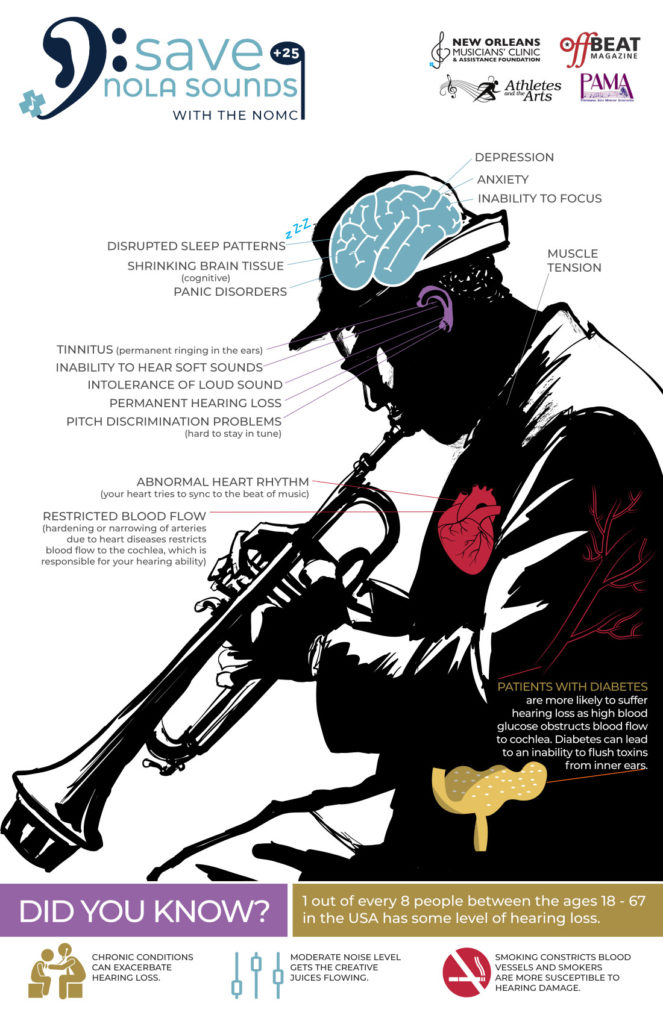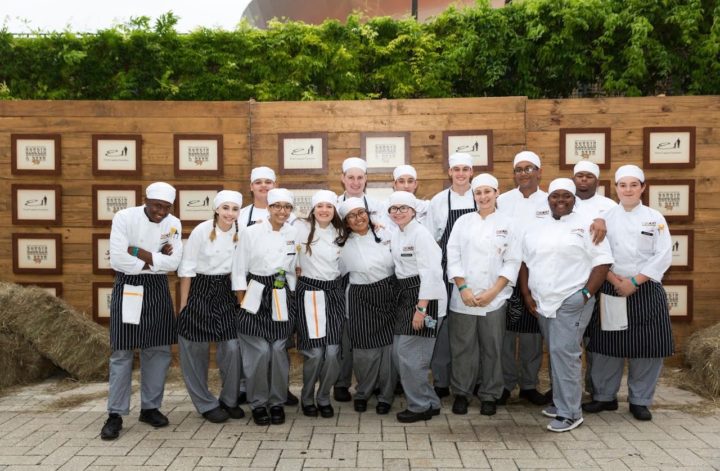The New Orleans Musicians’ Clinic and Assistance Foundation new program Save Sounds renews efforts to prevent and treat hearing loss among local musicians,in turn protecting and preserving the music, and thereby the culture, for which our city is known.
New Orleans Musicians’ Clinic founder Bethany Ewald Bultman distinctly recalls the first time she became aware of musicians’ “acoustic battlefield.” Nearly 25 years ago, Bultman was enjoying a music-filled evening at Fritzel’s Jazz Pub, when one of the musicians, who happened to be a friend of Bultman’s, suffered a severe panic attack while performing. “He couldn’t hear the other musicians he was playing with because a tee shirt shop was blaring Zydeco across the street and a beer truck was parked on the corner with its loud engine running,” says Bultman.
Not long after this incident, Bultman attended a Performing Arts Medicine Symposium where she learned about a group of audiologists and neurologists who had made it their life work to protect musicians from noise-induced hearing disorders. “That is how the New Orleans Musicians Clinic began our program Safe Sounds,” recalls Bultman.
According to the National Institute of Health, professional musicians are nearly four times as likely to develop noise-induced hearing loss (NIHL) as the general public. Just last year drummer Dave Grohl added his name to a long list of famous musicians suffering from NIHL, a list that spans musical genres and styles, from Brian Wilson of the Beach Boys to Nine Inch Nails front man Trent Reznor, and they aren’t the only ones.
Public Health Director of the New Orleans Musicians’ Clinic and Assistance Foundation Taylor Cohen began her involvement in the Save Sounds Program passing out ear plugs to festival-goers at French Quarter Festival. “People love live music and they want to get up close,” says Cohen. “A lot of people don’t consider the volume, and the hearing loss, and tinnitus (ringing in your ears), and how it can affect your hearing for the rest of your life.”

Raising awareness and destigmatizing the use of ear plugs to prevent NIHL is the core of the Save Sounds Program. The more people talk about it, from musicians and audio engineers to dancers and bartenders, the sooner prevention can start. “[People] often don’t want to talk about it because they’re afraid of losing their jobs, jobs that depend on their hearing ability” says Cohen. “Sometimes the greatest effort is just having the conversation.”
Custom “musician earplugs” allow musicians to maintain the fidelity of sound while reducing the sound’s intensity, but they’re often accompanied by a $200 price tag, a luxury many musicians can’t afford. In partnership with the New Orleans Speech & Hearing Center, NOMC’s primary care doctor is able to offer referrals for custom earplugs, significantly reducing the cost.
Those suffering from NIHL – whether it be tinnitus, hyperacusis (reduced tolerance to sound), or double hearing – also frequently suffer from mental health issues caused by hearing loss. When everyday interactions are fraught with confusion, or when a musician can’t hear the people she’s playing with, or when sleep patterns are disrupted by the ringing in your ears, often patients suffer from depression and anxiety.
“The Save Sounds program eventually bled into our You Got This program which is for mental health,” says Cohen. You Got This (YGT) is The New Orleans Musicians’ Clinic and Assistance Fund’s inclusive mental health outreach program designed to keep our creative community connected and informed, and to help build mindful habits around mental health and self-care. “It also turned into a dancer wellness program to protect performing artists, particularly dancers – burlesque performers, ballet, strippers – because they are also performing in these environments with loud volumes.”
One of the most pervasive symptoms of hearing loss among musicians and performers is tinnitus, a constant ringing in your ears that can affect your mental health, and there is no direct treatments available through conventional medicine. With this in mind, the NOMC has turned to an alternative approach called Mindfulness Based Tinnitus Stress Reduction (MBTSR). “It sort of focuses on what is worse right now — the sound that I’m hearing or my reaction to the sound?” explains Cohen.
Dr. Jennifer Gans, a clinical psychologist in San Francisco, California specializing in the psychological impact of deafness and hearing, helped to bring this alternative therapy to New Orleans. Jon Hébert, a local artist and musician, and a patient of NOMC suffering from tinnitus, was forever changed by MBTSR and he wanted to share it with other musicians suffering from the same condition. “He’s [Jon Hébert] been offering free classes, just because he feels so genuinely tied to the cause,” says Cohen. “It kind of became the community support program for artists suffering from hearing loss.”
The ultimate goal of Save Sounds is to protect artists’ hearing and their ears through awareness, prevention, and engaging with local physicians. “We are trying to preserve the culture and the sounds of New Orleans” says Cohen. “I care deeply about preventing health issues, of all kinds, especially hearing loss and tinnitus – since it is preventable and not curable!”
*Article originally published September 2023 in French Quarter Journal
**Lead image: Nancy Ochsenschlager, associate producer of the New Orleans Jazz and Heritage Festival, 1982-2005, has worn hearing aids since 2007. Nancy speculates that the severe nerve damages that caused her profound hearing loss did not come from listening to music, but from the occupational hazard of festival production radios. Photo courtesy NOMC



